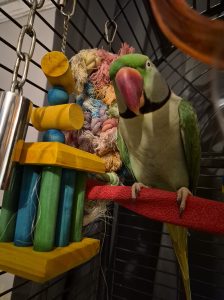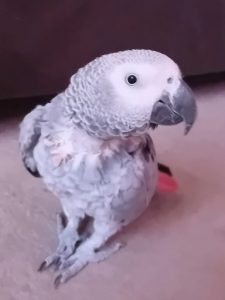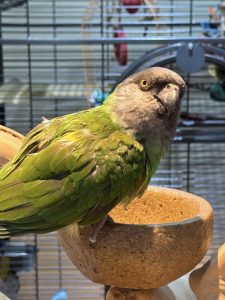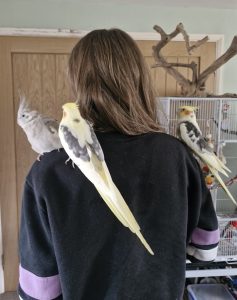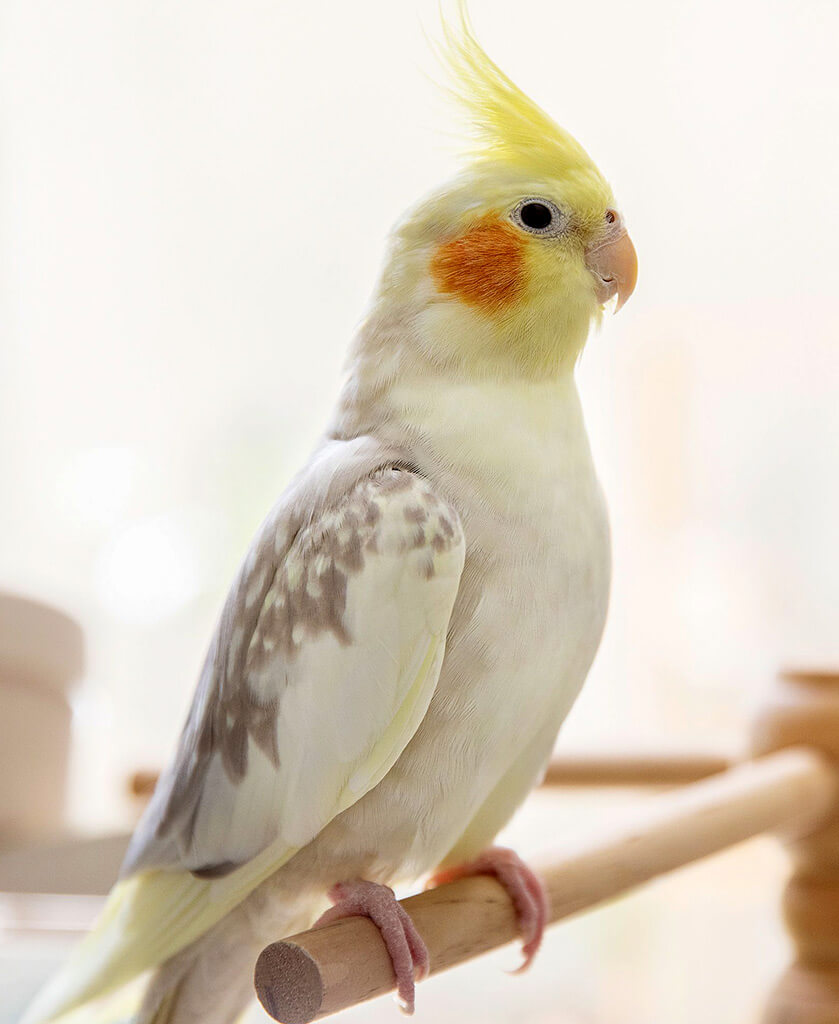
Cockatiel
The cockatiel is a small parrot of the Cacatuidae family. They average 12.8 inches or 32 cm in length (including tail). The cockatiel’s distinctive pointed yellow crest is held erect when startled or excited, while a crest slightly tilted indicates a relaxed state of mind. The plumage is generally mid-grey, lighter underneath, with an orange cheek patch and a prominent white blaze on the wings.
Both the cock and the hen have yellow facial feathers. Male cockatiels are very protective and nurturing of their offspring and are known to be very capable of raising their newborns if the mother is unable to.
Cockatiel lifespan in captivity are generally given as 15-20 years.
Further information
Cockatiels are generally not really CUDDLY, but they do like to hang out with their ‘human mates” and be preened by them. However, they generally do not like to be man-handled by people.
Hand-fed, well-socialized cockatiels can form very strong bonds with their owners. Their popularity as pets is in part because of their calm temperament, to the point that they can even be bullied by smaller but more confident birds such as Budgies and the far more aggressive Love birds.
Great care and supervision should be provided when mixing cockatiels with other birds. It is not uncommon at all for a larger or smaller bird to maim the cockatiel, potentially creating life-threatening injuries.
Cockatiels don’t “scream” they are more known for constant household noises or talking, but there whistling and slight screeching is very high pitched and continuous so i would mark them as a 6.
Cockatiels are generally better at imitating whistles than speech. Some do learn to repeat phrases. Cockatiels can mimic many sounds, for example the bleep of a car alarm, a ringing telephone.
Cockatiels normally start breeding from early spring to autumn time they are and will lay eggs where ever they can. With warmer indoor temperatures and more hours of natural daylight this can start a female cockatiel to want to lay a lot.
When you detect any of the following signs of illness you should take your cockatiel to an avian vet as soon as possible – try to visit a vet experienced with birds so a correct diagnosis can be given. Vitamin A and calcium deficiency are the most common deficiencies seen in seed junkies. Since seeds are higher in fat than many other foods, many seed eaters are often obese as well. Vitamin A
Available colour variants include Lutino, Pearl, Cinnamon, Pied, Silver, and Whiteface and combinations such as lutino pearl, whiteface pied, and the very rare whiteface lutino which is the technical term for albino cockatiels. There have also been reports of an ‘Olive’ variant
Cockatiel diet is extremely important and is the key to having a healthy cockatiel – along with exercise.
Give your bird a good-quality cockatiel seed mix (not parrot mix). These are readily available at pet suppliers and supermarkets. Be aware though that most ready-mixed cockatiel seed contains far too many sunflower seeds and these are extremely fattening. For this reason I tend to make up my own mix for my cockatiels. I buy a 50/50 mix of budgie seed and plain canary seed and then add a few sunflower seeds. Do not buy the seed in bulk – you are best to purchase small fresh amounts.
Alternatively, you can offer your cockatiel a pellet diet.
Small amounts of ‘people’ food are fine for cockatiels occasionally. They can have a nibble on crackers, cereal such as cornflakes, hard-boiled egg and wholemeal bread. Also try rice, pasta, potato, pumpkin, sweet potato – these must be offered cooked, not raw.
Cockatiels enjoy spray millet and seed treats such as honey bells or sticks. Fresh drinking water is required daily. Also make available cuttlebone, and calcium, iodine and mineral blocks. Vitamin supplements in the drinking water once a week or fortnight are a good idea, although do not leave these in the water for long as bugs can grow very quickly. Some people prefer to sprinkle powdered vitamins onto the seed or moist food, eg apple pieces or spinach. Either way, be sure to follow the product’s directions with regard to dosage amount and frequency.
A cockatiel diet must be supplemented with fresh fruit and vegetables on a daily basis. An all seed diet often results in an unhealthy or overweight cockatiel.
Try the following:
FRUIT:
Apple, grape, guava, kiwi fruit, mango, melon, nectarine, orange, peach, pear, pomegranate, plum, strawberry, tangerine, watermelon
VEGETABLES:
Bok choy, broccoli, carrot (chopped or grated), celery, chard, lettuce (but small amounts of lettuce and not too often as not a lot of goodness), peas, silverbeet, spinach, sweetcorn, watercress, zucchini.
Favorites with cockatiels tend to be apple, egg, pasta, peas, rice, silverbeet, spinach, sweetcorn.
A good multi vitamin is also a must for complimenting their diet to ensure they are getting all they need.
More information
Read more about other parrot species
30+
years experience between our members
30+
years experience between our members
30+
years experience between our members
Our feathered friends
Looking for new homes
From loving tickles to lifelong friend









